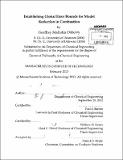Establishing global error bounds for model reduction in combustion
Author(s)
Oxberry, Geoffrey Malcolm
DownloadFull printable version (11.27Mb)
Other Contributors
Massachusetts Institute of Technology. Department of Chemical Engineering.
Advisor
Paul I. Barton and William H. Green.
Terms of use
Metadata
Show full item recordAbstract
In addition to theory and experiment, simulation of reacting flows has become important in policymaking, industry, and combustion science. However, simulations of reacting flows can be extremely computationally demanding due to the wide range of length scales involved in turbulence, the wide range of time scales involved in chemical reactions, and the large number of species in detailed chemical reaction mechanisms in combustion. To compensate for limited available computational resources, reduced chemistry is used. However, the accuracy of these reduced chemistry models is usually unknown, which is of great concern in applications; if the accuracy of a simplified model is unknown, it is risky to rely on the results of that model for critical decision-making. To address this issue, this thesis derives bounds on the global error in reduced chemistry models. First, it is shown that many model reduction methods in combustion are based on projection; all of these methods can be described using the same equation. After that, methods from the numerical solution of ODEs are used to derive separate a priori bounds on the global error in the solutions of reduced chemistry models for both projection-based reduced chemistry models and non-projection-based reduced chemistry models. The distinguishing feature between the two sets of bounds is that bounds on projection-based reduced chemistry models are stronger than those on non-projection-based reduced chemistry models. In both cases, the bounds are tight, but tend to drastically overestimate the error in the reduced chemistry. The a priori bounds on the global error in the solutions of reduced chemistry models demonstrate that if the error in the time derivatives of the state variables in the reduced model is controlled, then the error in the reduced model solution is also controlled; this thesis proves that result for the first time. Source code is included for all results presented. After presenting these results, the development of more accurate global error information is discussed. Using the error bounds above, in concert with more accurate global error information, it should be possible to assess better the accuracy and reliability of reduced chemistry models in applications.
Description
Thesis (Ph. D.)--Massachusetts Institute of Technology, Dept. of Chemical Engineering, 2013. Cataloged from PDF version of thesis. Includes bibliographical references (pages 223-239).
Date issued
2013Department
Massachusetts Institute of Technology. Department of Chemical EngineeringPublisher
Massachusetts Institute of Technology
Keywords
Chemical Engineering.